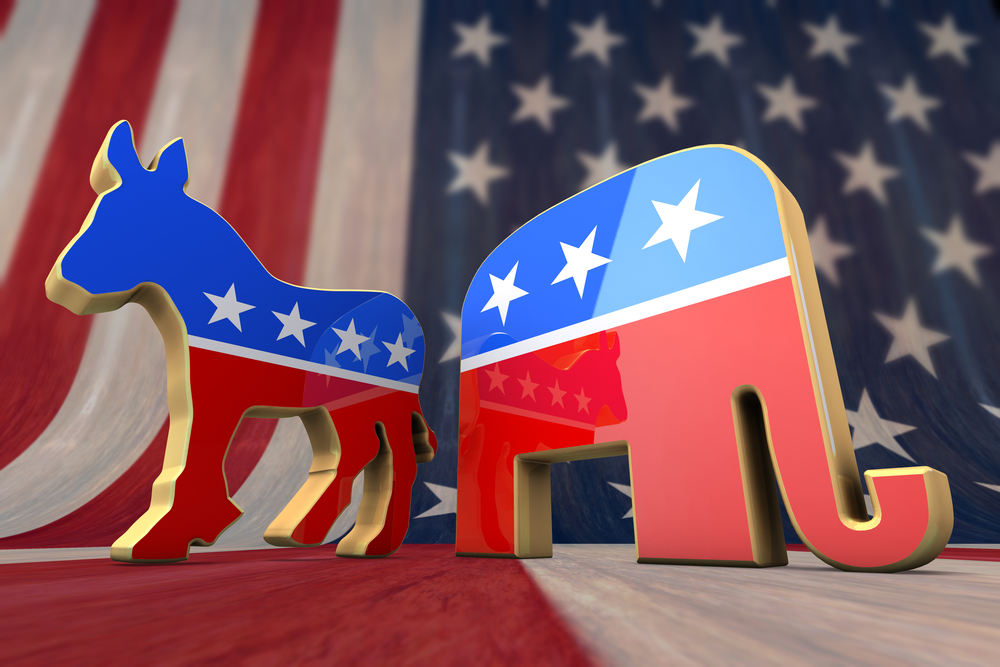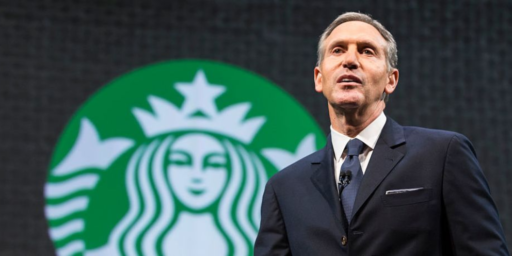Today in Terrible Columns
Bret Stephens on Howard Schultz
 To stay on the topic of my previous post, I read Bret Stephens’ column on Howard Schultz: Howard Schultz Derangement Syndrome.
To stay on the topic of my previous post, I read Bret Stephens’ column on Howard Schultz: Howard Schultz Derangement Syndrome.
He begins:
Howard Schultz of Starbucks fame told “60 Minutes” on Sunday that he was “seriously thinking” about an independent bid for the presidency, and boy oh boy are liberals and progressives unhappy with the idea. The lifelong Democrat has suddenly morphed, in the eyes of his new detractors, into a vainglorious upstart, entitled rich guy, and potential spoiler who could hand the election to Donald Trump.
Could be. But the neuralgic reaction to his bid says something about the ideological drift of the Democratic Party — and of its vulnerabilities against a historically weak president.
The reaction is quite easy to understand: the 2016 election was lost to Democrats due to razor thin margins in Michigan, Wisconsin, and Pennsylvania. They also remember Ralph Nader in 2000 in Florida. So yes, they are paranoid about anything that might help Trump win the Electoral College again. It strikes me as a not unreasonable concern (although, as I noted in my previous post on Schultz, listening to him makes me wonder if he wouldn’t just take votes from Trump).
Indeed, despite the fact that Stephens mocks this concern, he goes on to pretty much confirm it four paragraphs into his column:
Schultz’s politics are to the left of mine, but I would vote for someone like him in a heartbeat if the other names on the ballot are Trump and, say, Massachusetts Senator Elizabeth Warren.
And this is exactly what a lot of anti-Trumpers fear. That instead of never-Trumpers holding their noses and voting Democratic, they will vote third party. The logic goes that the best bet the Dems have is to make sure they get all the anti-Trump votes given the way the Electoral College can distort the popular vote (which, one should recall, the Dems won handily in 2016). So, the paranoia over Schultz (or any third party candidate) is not crazy town, even if it is emotional to a degree.
It is stunning that Stephens doesn’t see this.
I will note that if Schultz were to drain votes from Trump, that should actually help the Democratic nominee, but I think that the reaction is not “derangement” it is legitimate fear of anything that might help produce a second Trump term.
Worse, though, Stephens buys into the whole Myth of the Centrist Savior:
It found that two-thirds of Americans are neither conservatives nor progressives. They are moderates, liberals and the disengaged, defined by their ideological flexibility, support for compromise, fatigue with the political debate — and the sense that they’re being ignored and forgotten.
“America’s Exhausted Majority wants to see the opposing tribes move beyond constant conflict,” the report notes. “Many who have disengaged from politics (especially in the Passive Liberal and Politically Disengaged groups) cite the tribal behavior of political combatants as a reason.”
An independent candidacy like Schultz’s exists to appeal to this silent majority.
We seem to go through this constantly–we fail to understand that this does not mean that there is a pathway for the Centrist Party to emerge and overwhelm the Rs and the Ds. For one thing, the Ds are actually a pretty centrist party at the moment (yes, some will howl at this, given that any minute now the Ds are going to impose 70% top marginal rates, Medicare for all, and free college). But more importantly, as I keep pointing out over and over and over again: the institutional parameters of our system (single seat plurality elections, the Electoral College, primaries as nominating processes, the Senate, the too-small House, and so on and so on) all create the parameter in which we are going to have two parties (and in ways that help the Rs). Third way successes are structurally proscribed (save in very rare cases–the proverbial exceptions that prove the rule).
If we had a more representative electoral system, there would be space for a centrist party, although it likely would not be as big as the Centrist Savior cultists think it would be. But the current structure of competition means that this isn’t going to happen. There is not some “silent majority” out there looking for a conduit. I can’t stress this enough: most people who claim to be “independent” tend to vote regularly with one of the two major parties. Further, “independent” does not mean “centrist.” And even people who say they are “centrists” are not necessarily centrists on every single issue.
I also think, as Trump himself has shown, the overall salience of abortion means that it is hard to be centrist in presidential politics if “centrism” means a middle ground on a policy issue. On abortion, in the nominating process, it is hard to be a centrist, especially on the Republican side.
At any rate, is there any more lazy column (and it just keeps coming back, again and again) than the one that makes the claim that since so many people claim to be “independent” that therefore an independent has a real shot at the presidency?




Yes, thank you for that. We tried running a centrist against Trump last time. She lost.
Here is where I go off-topic and vent about one of my pet peeves – the notion that exceptions confirm rules. They do not. This is to ignore that the word “prove” is sometimes used as a synonym for “test.”
If a rule is a generalization, what the exceptions to the rule do is test and define the range of applicability of the rule.
(Back when I was working, we used to refer to meter testers as “meter provers,” for example of “prove” as synonym for “test”.)
@charon: I will push back (in a friendly fashion) and note that I specifically used the modifier “proverbial” rather than trying to use the terms in a more scientific sense.
@charon: yep. See also: “proving grounds”
Not surprising that Stephen’s would find Schultz acceptable. Stephen’s issues are those of traditional economic conservatives, small government, low taxes and reining in entitlement spending along with support for Israel. While he’s nominally an opponent of abortion, that and other social issues aren’t that important to him. But yes today’s column wasn’t Bret’s best.
In truth Schultz is not a centrist in any sense in current America. A pundit commenting on Schultz, pointed out just less than 10% or Repugs and less than 5% of Dems adopt the position of cutting entitlements, particularly Medicare and SS, while keeping taxes low on the rich and business, and are liberal on social issues. Sorry I don’t have the link and can’t remember the writer.
Just a guess, but those that do agree with Schultz have incomes over $250,000 a year.
Perhaps.
It’s also pretty stunning that Dems don’t see that there is little appetite among the Never Trump right or the uncommitted Muddle for progressive unicorn candidates.
I don’t support Schulz, but I do think the buzz around his candidacy, on left and right, points to needs and desires that are not being served by either party.
I think he sees it just fine. He’s simply playing the role for the NYT that Pearce does here.
That posturing is what makes the article so ridiculous.
Let me push back again against the idea that a policy proposal that polls over 50 percent approval in the general electorate and 60-40 among independents (higher among Democrats) can be characterized as “far-left” or “unicorn” proposal. That’s today’s polling numbers of the 70 percent top marginal rate.
Attitudes have shifted. Deal with it. You don’t have to like it, but I will laugh at your “unicorns”. Did you notice that one of Trump’s basic pitches in 2016 was “the system is rigged against you”? He was right, but he’s not the guy to fix it. He’s the guy that rigged it even harder.
Howard Shultz better start figuring out how to defer his compensation, or do some very long-term investing.
@gVOR08:
Well, make up your mind. Did you “lose” because a centrist ran? Or did you “win” because she took the popular vote. Pick a lane, guys.
I feel like you’re going down the same rabbit hole the GOP did after 2012. “Well, we lost with a centrist candidate (Romney), so let’s nominate a rockhead!”. The result was Trump in the White House but only on an historical fluke and at a time when all the fundamentals favored Republicans by about 6 points. If Dems go down the same route, they’ll end up with four more years of Trump.
Howard Schultz sounds very much like neo-conservatives who say, ‘I didn’t leave the Democratic Party, it left me.’
I believe that some in the conservative commentariat class – guys like Bret Stephens, perhaps David Brooks, maybe Ross Douthat – who, although Republicans are generally getting what they want (tax cuts, conservative judges) – are disgusted by Trump the person, and want to get back to a ‘normal’ conservative candidate.
I’m of the opinion that following the gratuitous 60 Minutes celebrity interview with Schultz, and his subsequent dismissive and backhanded insults of the Democratic Party, Schultz is increasingly perceived as a conservative and not an ‘independent.’
Bret Stephens understands this – he doesn’t want Schultz to be defined and dismissed by liberals so early on. He’s feigning outrage at the quickly emerging and very rational Democratic Party opposition to Schultz, a guy who would, like Ralph Nader and Jill Stein, siphon support from a Democratic Party candidate.
You’re as disengenious as Stephens is…
Oh please, it’s not as if both can’t be true…
@Jay L Gischer:
Jay, with all due respect, but when you say “attitudes have shifted” you mean that the Dems have gone even further left. That doesn’t mean that everyone else has joined them.
And I know this may sound unkind, but Trump…Trump is the way 62 million people “dealt” with it.
@An Interested Party: How many people need to tell you this before you believe it?
@al Ameda:
What’s wrong with that? A lot of people are looking for someone a little conservative with an “independent” streak, and many of them are looking for that in someone other than Trump.
This is a national election and the Dems are playing by state race rules. You don’t need to run some unicorn to maximize turnout among your base. You need to appeal to those “independent” conservatives who will otherwise vote 3rd party or for the Republican. They’ll cross over if you let them.
Hmm…these people are saying something…whether you choose to believe it or not is on you…
Nor should you listen to disingenuous cranks who are trying to sell you a load of horseshit…
OT: your interim Brexit report: the knowledgable have been giving the warning, companies are starting to pull out of the U.K.–it still looks like the Brits are going to go hard-core no deal Brexit. I think the EU is now so totally sick and tired of the situation that they’re just saying “no more negotiations until you guys come up with something you can stick to” and quietly preparing for the U.K.’s total crash-out.
Too many Brits don’t seem to understand that just because you’re not getting everything you want in a negotiation, it does not mean that a) the other side is treating you unfairly b) they’re trying to sabotage you, or c) they’re declaring economic war on you.
@James Pearce:
@grumpy realist: One in three UK firms plan for Brexit relocation, IoD says
Brexshit is right.
Clearly you did not read The Art of the Deal Sadly, too many Brits did.